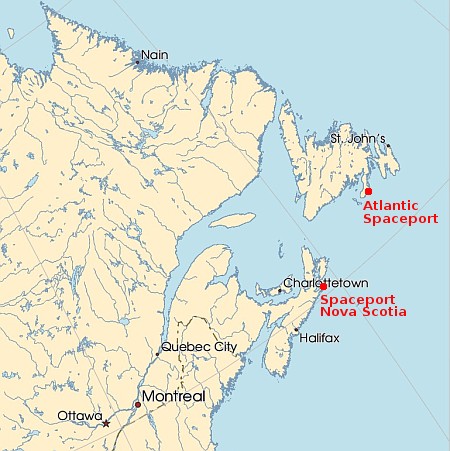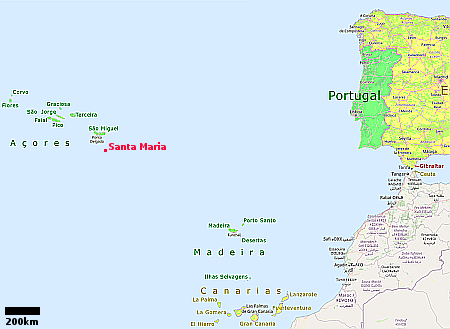Canadian rocket startup Nordspace postpones first suborbital test launch

Proposed Canadian spaceports
After trying twice earlier this week to launch its first suborbital test rocket from its Atlantic Spaceport in Newfoundland, the rocket startup Nordspace has decided to postpone that launch for at least several weeks, while it investigates the fuel leaks on the launchpad that caused fires during both launch attempts.
After detailed review over the last 15 hours, the root cause has been discovered to be related to our propellant quality slightly differing between vehicle tests at our test facility in Ontario, compared to our first launch test in Newfoundland and Labrador at our spaceport. This led to a fuel-rich scenario. All systems on the rocket and ground performed nominally after careful review. Personnel, rocket and the launch pad are perfectly safe and secure, and our safety systems operated nominally. As our company’s manufacturing and testing facilities are located in Ontario, there’s no expedient way to make the necessary modification with the temporary infrastructure and suppliers we have in place at our launch site.
This company is only about three years old, so this delay is hardly systematic to its operations. In that time they have established their own private spaceport, have built their first demo satellite (set to launch in June 2026), and developed a test suborbital rocket, Taiga, that is on the cusp of its first launch. The company is also developing its own rocket engines, as well as an orbital rocket dubbed Tundra.
Its speed puts to shame Canada’s other proposed spaceport in Nova Scotia, which was first proposed in 2016, and has far accomplished little. Many of its problems stemmed from the Ukraine War, which lost it the rocket it had hoped to market. Even so, it only signed its first launch customer in August of this year.

Proposed Canadian spaceports
After trying twice earlier this week to launch its first suborbital test rocket from its Atlantic Spaceport in Newfoundland, the rocket startup Nordspace has decided to postpone that launch for at least several weeks, while it investigates the fuel leaks on the launchpad that caused fires during both launch attempts.
After detailed review over the last 15 hours, the root cause has been discovered to be related to our propellant quality slightly differing between vehicle tests at our test facility in Ontario, compared to our first launch test in Newfoundland and Labrador at our spaceport. This led to a fuel-rich scenario. All systems on the rocket and ground performed nominally after careful review. Personnel, rocket and the launch pad are perfectly safe and secure, and our safety systems operated nominally. As our company’s manufacturing and testing facilities are located in Ontario, there’s no expedient way to make the necessary modification with the temporary infrastructure and suppliers we have in place at our launch site.
This company is only about three years old, so this delay is hardly systematic to its operations. In that time they have established their own private spaceport, have built their first demo satellite (set to launch in June 2026), and developed a test suborbital rocket, Taiga, that is on the cusp of its first launch. The company is also developing its own rocket engines, as well as an orbital rocket dubbed Tundra.
Its speed puts to shame Canada’s other proposed spaceport in Nova Scotia, which was first proposed in 2016, and has far accomplished little. Many of its problems stemmed from the Ukraine War, which lost it the rocket it had hoped to market. Even so, it only signed its first launch customer in August of this year.

